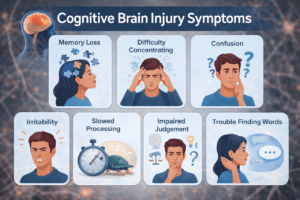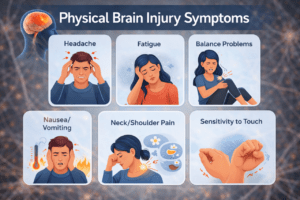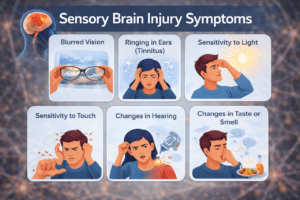
As a Virginia attorney who has represented many people with traumatic brain injuries, I’ve seen firsthand how concussion symptoms can turn someone’s life upside down. These cases usually involve car accidents, truck crashes, or motorcycle collisions, where the person’s head hits something hard, snaps back and forth in a whiplash motion, or experiences violent twisting forces that injure the brain.
A concussion is a mild traumatic brain injury. The challenge with concussion cases is that the injury is invisible. You can’t see it on the outside. This makes these cases difficult to prove, but not impossible. This article explains the symptoms of a concussion, how these symptoms matter in a legal claim, what evidence we use to prove your injury, and why you need an experienced attorney to build a winning case.
VIDEO: Concussion Symptoms After a Car Accident: What you Need to Know
For a legal consultation with a personal injury lawyer, call (434) 817-3100
Why Most People Recover, But Some Don’t
Most people who suffer a concussion will get better. They need proper medical treatment and may go through different types of therapy. But with time and care, they usually recover without lasting problems.
However, research shows that 10-15% of concussion victims become part of what doctors call the “miserable minority.” These are people whose symptoms last for months, years, or sometimes never go away. This is called post-concussive syndrome.
Why do some people struggle while others recover? Several factors play a role:
– The violence of the injury – How hard the impact was can play a role in outcome
– Multiple concussions – Previous brain injuries make recovery harder, especially if second impact syndrome occurs
– Age – Older adults and very young children often take longer to heal
– Emotional trauma – When the injury comes from a preventable accident, victims often feel angry, scared, or guilty, which can make symptoms worse
– Lack of proper treatment – Not getting the right medical care early on
For members of the miserable minority, life changes dramatically. They may never return to their old job, struggle with relationships, and face a lifetime of challenges. These are the cases where fair compensation becomes absolutely critical—because the injury has stolen their future.
The Four Categories of Concussion Symptoms
Concussion symptoms fall into four main categories. These are based on the domain of the brain that is impacted by the trauma. Understanding these categories helps us build strong legal cases because each symptom creates evidence we can use to prove your injury.
1. Mental and Thinking Problems (Cognitive Symptoms)
A concussion affects how your brain processes information. Common mental and thinking symptoms include:
– Confusion – Not understanding what’s happening around you
– Memory loss – Forgetting what happened right before or after the accident
– Mental fog – Feeling like your brain is cloudy or slow
– Trouble concentrating – Can’t focus on tasks or conversations
– Slow thinking – Taking longer to process information
– Executive function problems – Difficulty planning, solving problems, or handling changing situations
– Feeling dazed – Like you’re in a dream or not fully present

Cognitive symptoms are the hallmark of mild traumatic brain injury and often the most debilitating for accident victims trying to return to work. Forgetting conversations, reading the same paragraph five times without retention, struggling to find common words, or taking twice as long to complete familiar tasks are not “just stress”—they’re signs of brain injury that won’t show up on standard ER imaging. These symptoms typically worsen with mental effort, a phenomenon called “cognitive fatigue.” If you’re experiencing these issues after a car or truck accident, neuropsychological testing can document the injury that CT scans miss—critical evidence for your injury claim.
Why This Matters for Your Legal Claim:
These symptoms directly impact your ability to work, especially if you have a professional job that requires sharp thinking. A teacher who can’t track multiple students, an accountant who makes calculation errors, or a manager who struggles with decision-making all face serious career damage.
Medical Tests That Can Corroborate These Symptoms:
– Neuropsychological testing – Detailed tests that measure memory, attention, processing speed, and problem-solving abilities. These tests provide objective scores showing exactly where your brain function has declined.
– Computerized cognitive tests – Tools like ImPACT testing that measure reaction time and thinking speed
– Functional MRI (fMRI) – Shows which parts of your brain are working harder to complete simple tasks, proving your brain is struggling
Evidence We Collect:
– Before-and-after work performance reviews
– Reports from supervisors about new mistakes or problems
– Testimony from coworkers who notice changes
– Records showing demotions, job loss, or inability to return to work
– Family members describing how you struggle with tasks that used to be easy
2. Physical Symptoms
Physical symptoms are often the most obvious signs of a concussion:
– Headaches – Often severe and persistent
– Nausea or vomiting – Feeling sick to your stomach
– Dizziness – Feeling off-balance or like the room is spinning
– Numbness or tingling – Strange sensations in arms, legs, or face
– Balance problems – Trouble walking straight or coordinating movements
– Extreme tiredness – Feeling exhausted even after rest
– Insomnia – Can’t fall asleep or stay asleep
– Sleeping too much – Need for excessive sleep (hypersomnia)
– Drowsiness – Feeling sleepy all day despite rest
– Changed sleep schedule – Sleeping at wrong times
– Non-restorative sleep – Waking up exhausted even after 8+ hours

Physical symptoms of concussion often appear gradually after a car or truck accident. These symptoms may worsen over days or weeks, even if your initial ER visit showed no visible injury on CT scans. If you’re experiencing persistent headaches, unexplained fatigue, or balance issues after an accident, document these symptoms daily and consult a neurologist who specializes in traumatic brain injury. At MartinWren, P.C., we help Virginia accident victims get the proper medical evaluation and compensation they deserve.
Why This Matters for Your Legal Claim:
Physical symptoms make everyday activities painful or impossible. Constant headaches prevent you from working at a computer. Light sensitivity means you can’t drive or enjoy outdoor activities. Balance problems make it dangerous to climb stairs or play with your children.
Medical Tests That Can Prove These Symptoms:
– Headache diaries – Medical records tracking frequency and severity of headaches
– Sleep studies (polysomnography) – Records brain waves, breathing, and movements during sleep
– Actigraphy – Wearable device that tracks sleep patterns over weeks
– Epworth Sleepiness Scale – Standardized measure of daytime sleepiness
– Sleep diaries – Medical records documenting sleep patterns
Evidence We Collect:
– Medical records documenting every doctor visit and complaint
– Prescriptions for pain medication, anti-nausea drugs, or migraine treatments
– Photos or videos showing you struggling with balance or daily tasks
– Testimony from physical therapists about your limitations
– Records showing you can no longer participate in hobbies, sports, or activities you enjoyed
3. Emotional and Behavioral Changes
Brain injuries often cause personality changes that hurt relationships and quality of life:
– Irritability – Getting annoyed or angry easily when that was not a problem before
– Mood swings – Emotions changing rapidly without reason
– Depression – Persistent sadness or hopelessness
– Anxiety – Increased worry or fear
– Loss of patience – Snapping at family members or coworkers
– Explosive temper – Angry outbursts that never happened before the injury
– Social withdrawal – Avoiding friends and family when that was not the case before
– Loss of interest – Not caring about things that used to bring joy

Emotional changes after an accident are often the most misunderstood TBI symptoms—and the ones that loved ones notice first. Sudden mood swings, unexplained anger, new anxiety, or depression aren’t character flaws—they’re neurological symptoms caused by injury to your brain’s frontal lobe. Insurance companies frequently dismiss these as “stress from the accident,” but they’re legitimate medical symptoms that require proper diagnosis and treatment. If your family says “you’re not yourself” after an accident, listen to them. These personality changes are often the clearest evidence of brain injury.
Why This Matters for Your Legal Claim:
Many concussion victims describe emotional changes as the worst part of their injury. A patient, loving parent becomes short-tempered with their children. A social person withdraws from friends. These changes destroy marriages, damage parent-child relationships, and isolate victims from their support systems. These all support non-economic damages in your case.
Medical Tests That Can Prove These Symptoms:
– Psychological evaluations – Licensed psychologists can diagnose depression, anxiety, and personality changes
– Minnesota Multiphasic Personality Inventory (MMPI) – Standardized test that measures emotional and behavioral functioning
– Beck Depression Inventory – Objective measure of depression severity
– Hamilton Anxiety Rating Scale – Quantifies anxiety levels
Evidence We Collect:
– Testimony from spouses describing personality changes
– Statements from children about how mom or dad is “different now”
– Friends explaining how you’ve withdrawn from social activities
– Records of marriage counseling or family therapy
– Evidence of damaged relationships or divorce
– Mental health treatment records
4. Sensory Problems
Concussions disrupt senses in multiple ways:
– Sensitivity to light (photophobia) – Normal light feels painfully bright
– Sensitivity to sound (phonophobia) – Regular noise feels too loud
– Blurred or double vision – Trouble seeing clearly
– Changes to smell or taste

Sensory symptoms are your brain’s warning signs that something is wrong after a head injury. Blurred vision, persistent ringing in your ears, or sudden sensitivity to light and noise indicate potential traumatic brain injury—even if your ER scan came back “normal.” These symptoms occur because current CT and MRI technology cannot detect the microscopic cellular damage that causes mild TBI. If your senses feel “off” after an accident, take these symptoms seriously and seek specialized neurological evaluation.
Why This Matters for Your Legal Claim:
Sensory problems with vision, hearing, smell, and taste can range from annoying to debilitating. These problems can work with others to make the injury much worse to deal with.
Medical Tests That Can Prove These Symptoms:
– Vestibular testing – Measures balance and inner ear function, and it can show specific balance deficits
– Visual field testing – Documents vision problems objectively
– Videonystagmography (VNG) – Tests the inner ear and balance system and provides objective evidence of a mild traumatic brain injury
– VOMS testing (Vestibular/Ocular Motor Screening) – Evaluates eye movements and visual symptoms and can corroborate a mild brain injury
Concussions in Children: Special Challenges
Children can suffer concussions just like adults, but their symptoms may show up differently. Young children can’t always explain what they’re feeling, so we look for behavioral changes:
Signs of Concussion in Children:
– Crying more than usual
– Changes in how they play
– Frequent temper tantrums
– Loss of interest in favorite toys or activities
– Regression in skills they recently learned (like potty training)
– Balance problems and trouble walking
– Constant headaches (shown by holding or rubbing their head)
The Hidden Problem:
For babies and toddlers who suffer brain injuries, the full impact may not appear for years. The child may seem fine at age 2, but struggle with learning when they reach school age. This is because certain brain functions don’t develop until later in childhood.
Why This Matters for Legal Claims:
Children’s brain injury cases require experienced attorneys who understand how to preserve the child’s legal rights into the future. In Virginia, the statute of limitations for minors is different than for adults, and claims must account for future damages that may not become apparent for years.
Truck Accidents and Concussions: A Deadly Combination
As Virginia’s only board-certified truck accident attorney, I’ve seen numerous concussion cases from truck crashes. The massive size and weight of commercial trucks create enormous forces in collisions.
When an 80,000-pound tractor-trailer strikes a passenger vehicle, the forces on the occupants’ heads and necks are extreme. Even if someone doesn’t lose consciousness, they may still suffer a serious concussion from:
– Head striking the steering wheel, window, or headrest
– Violent back-and-forth whiplash motion
– Rotational forces as the vehicle spins
– Multiple impacts during a crash sequence
Critical Evidence in Truck Accident Concussion Cases:
Truck accident cases require gathering evidence that passenger car cases don’t need:
– The truck’s black box data showing speed and braking
– The driver’s logbooks and hours of service records
– The trucking company’s safety record
– Maintenance records for the truck
– The driver’s qualification file and training records
– Evidence of federal regulation violations
This evidence helps prove not just that you have a concussion, but that the trucking company’s negligence caused your injury.
Click to contact personal injury lawyers today
What to Expect When Pursuing a Brain Injury Claim
If you’re considering legal action for your concussion, understanding the process helps. We’ve written a detailed guide about what to expect when pursuing a brain injury claim in Virginia that covers:
– How long cases typically take
– What medical treatment you should get
– How we value your claim
– What happens during litigation
– How we prepare for trial
The key point is this: brain injury cases are complex and time-consuming. They require attorneys who understand both the medicine and the law, who have relationships with the right experts, and who aren’t afraid to take cases to trial when insurance companies won’t offer fair compensation.
The Importance of Acting Quickly
If you suffered a concussion in an accident, time is critical for two reasons:
1. Medical Reasons:
Getting proper treatment early gives you the best chance of recovery. The brain heals best when:
– You rest immediately after the injury
– You gradually return to activities under medical supervision
– Medical specialists provide treatment for specific symptoms
– You avoid second impacts that could cause permanent damage
2. Legal Reasons:
Check out my article and video about the First 48 Hours After a Truck Crash and the need to act quickly. Evidence disappears over time:
– Witnesses forget details
– Video footage gets deleted
– Physical evidence is destroyed
– Medical records become harder to obtain
– Insurance companies become more skeptical of delayed treatment
Virginia law also sets strict deadlines (statutes of limitations) for filing lawsuits. If you wait too long, you lose the right to compensation forever. Va. Code § 8.01-243 requires personal injury claims to be filed within two years of the incident that caused the injury.
Complete a Case Evaluation form now
Get Help from Experienced Brain Injury Attorneys
Concussion cases are among the most challenging personal injury claims to prove and win. The injury is invisible, the symptoms are subjective, and insurance companies fight these cases aggressively.
You need attorneys who:
– Understand the medical science of brain injuries
– Know which experts to hire
– Can spot all the evidence needed to build your case
– Have a track record of winning brain injury cases
– Aren’t afraid to take cases to trial
At MartinWren, P.C., we have extensive experience handling complex brain injury cases throughout Virginia. As Virginia’s only board-certified truck accident attorney, I understand how the violent forces in serious crashes cause concussions, and I know how to prove these cases even when CT scans appear normal.
Most people recover well from concussions. But if you’re part of the miserable minority whose symptoms won’t go away, you deserve experienced legal representation to fight for the compensation you need for a lifetime of challenges.
If you or a loved one suffered a concussion in a car accident, truck crash, motorcycle collision, or any other type of accident, please contact our brain injury lawyers today. We offer free consultations, and we can meet at a time and place convenient for you—including your home or hospital.
For questions about a brain injury case, please contact Robert E. Byrne, Jr. at (888) 775-8808.
—–
**About the Author:** Robert E. Byrne, Jr. is a personal injury attorney at MartinWren, P.C. in Charlottesville, Virginia. He is Virginia’s only board-certified truck accident attorney through the National Board of Trial Advocacy and has extensive experience representing victims of catastrophic injuries, including traumatic brain injury cases throughout Virginia.
Other Traumatic Brain Injury Resources
The Complete Guide to Traumatic Brain Injury Cases in Virginia
Blood Tests for Traumatic Brain Injuries: Medical Advances and Legal Implications
Open v. Closed Head Brain Injuries: Know the Critical Differences
Links to Virginia TBI Attorneys:
Blacksburg Traumatic Brain Injury Lawyer
Charlottesville Brain Injury Lawyer
Fairfax Traumatic Brain Injury Lawyer
Farmville Traumatic Brain Injury Lawyer
Fredericksburg Traumatic Brain Injury Lawyer
Harrisonburg Traumatic Brain Injury Lawyer
Lexington Traumatic Brain Injury Lawyer
Richmond Traumatic Brain Injury Lawyer
Roanoke Traumatic Brain Injury Lawyer
Staunton Traumatic Brain Injury Lawyer
Salem Traumatic Brain Injury Lawyer
Waynesboro Traumatic Brain Injury Lawyer
Call (434) 817-3100 or complete a Case Evaluation form



